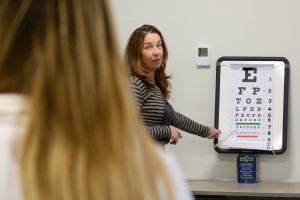
Anne-Marie Uebbing, associate professor of Nursing at Mount Saint Mary College and a certified Family Nurse Practitioner, provides vision testing during a joint project with the college’s School of Nursing and the Desmond Center for Community Engagement and Wellness.
At Mount Saint Mary College, nurse practitioner students are being trained for a healthcare landscape increasingly shaped by artificial intelligence.
Like many other aspects of life, AI is rapidly being integrated into the healthcare sector, presenting both powerful new capabilities and potential pitfalls for future clinicians.
Anne-Marie Uebbing, associate professor of Nursing at the Mount and a certified Family Nurse Practitioner, sees AI as a pathway for advancing patient care, provided that clinicians are taught to use it critically.
At first glance, healthcare doesn’t have much to do with the wise-cracking, web slinging superhero, Spider-Man. But oddly enough, his famous catchphrase captures Uebbing’s feelings on the matter perfectly: “With great power, comes great responsibility.”
Great Power
The benefits of AI usage in healthcare can be numerous, notes Uebbing. For example, AI is highly beneficial in long-term health management, allowing clinicians to utilize predictive analytics. In essence, AI can forecast future health issues, allowing doctors and patients to work together on preventive measures.
Uebbing also notes AI’s powerful image analysis capabilities. In diagnostics, AI can be far more accurate than a human.
“If you’re looking at images, AI is great,” she explained. “It can aggregate mass amounts of data. For example, AI can look at thousands of mammograms and then compare them to yours.” She notes that the validity of an image analysis using this technique is “better than the eyes of a human.”
Another benefit of AI is empowering professionals. Uebbing’s exploration into the technology led her to take intensive courses on the engineering side.
“I was excited about coding [and] technology you can use build your AI own tools for a clinical setting,” she explained.
Great Responsibility
After hearing about the amazing things AI can do, it’s tempting to see it as a sort of magic bullet. But like any tool, one needs to be properly trained in the use of AI, or risk its misuse.
First and foremost, Uebbing stresses that AI should function as a complement to education, not a substitute for it: “It is not by any means meant to substitute a well-trained mind,” she said.
Uebbing is concerned that rapid adoption of AI, particularly by new clinicians, could compromise the foundational training that emphasizes critical thinking and comprehensive patient assessment.
“If you’re coming in brand new and you have this opportunity for a quick AI-generated response for a diagnosis, the critical thinking that occurs might be compromised,” she explained. She adds that excessive reliance on AI could impair a clinician’s ability to perform a thorough physical assessment of the patient.
To gauge preparedness, Uebbing and a student collaborator, Autumn Taylor from the Wharton School of Business (Johns Hopkins), developed survey tools for nurse practitioner students and their preceptors. Uebbing uses a case study involving a peritonsillar abscess (PTA) to highlight the limitations of relying on technology. For context, PTAs are clinical emergencies and need immediate attention. Uebbing notes that AI might miss key clinical signs like drooling, dysphonia, or change in voice, which would prompt a trained clinician to refer the patient immediately.
“It was a minority, but some students said ‘sent home with medication,’” Uebbing explained.
Your Friendly Neighborhood Nurse Practitioner
The Mount’s commitment to developing well-trained, critically thinking practitioners is realized through its rigorous graduate programs. The college’s School of Nursing offers a Master of Science in Nursing (MSN) and Post-Master’s Certificates for experienced nurses looking to advance their practice. These programs provide flexible, hybrid formats designed for working professionals, featuring classes held once a week in the evening. MSN students can choose from three critical tracks: Family Nurse Practitioner, Adult-Gerontology Primary Care Nurse Practitioner, and Psychiatric Mental Health Nurse Practitioner.
Each advanced track requires a minimum of 600 precepted clinical practice hours to ensure graduates have the hands-on experience necessary to thrive in a complex healthcare environment – one that may include the utilization of AI.
